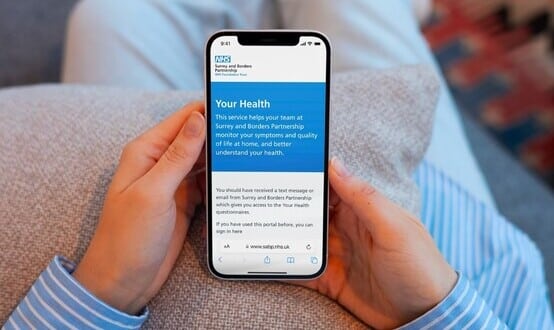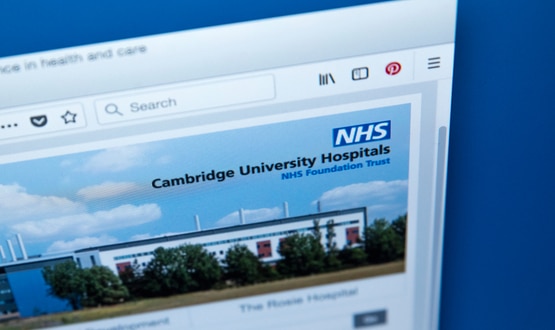Cambridge’s MyChart patient portal has 300+ users

One of the only patient portals in the UK that is directly integrated with an electronic patient record (EPR) has more than 300 active users.
Cambridge University Hospitals NHS Foundation Trust’s MyChart patient portal allows patients limited access to their health record on its Epic EPR.
Patients are able to view upcoming appointments, test results, medications, clinical correspondence, vital signs, demographic details, allergies and past appointment details.
Susan Greenhill, head of clinical information systems and MyChart, told Digital Health News that the technology has been received enthusiastically by staff and patients.
“There’s a real demand now from the organisation”, she said. “Because MyChart has huge opportunities for patients to input information in to their own health records that we hold here, answering questions for clinicians.”
It is used in obesity and oncology, and will shortly be rolled out in immunology and allergy.
As well as viewing data, patients can contribute medical information, and can access MyChart using a web address or a smartphone app.
Zafar Chaudry, chief information officer at the trust, said that by having the portal directly integrated into Epic, patient safety is improved.
“[MyChart] is getting real feed of data directly from the database, and that in my opinion is the safest way”, he said. “When you bolt all these systems together and interfaces fail, that’s when you run clinical risk.”
For Greenhill the future of MyChart involves a pre-appointment questionnaire being sent out to the patient which will then pre-populate their record prior to the patient’s visit to hospital.
The clinician will then be able to review that information which will make the appointment more efficient, said Helen Balsdon, chief nursing information officer and assistant director of nursing at the trust.
“You think, most patient’s hospital appointments are only ten to 15 minutes long, you can spend a good chunk of your time going what’s happened since I last saw you.”
“Hopefully it should make the time that they are with us, which for most patients is not very much in their life, it should make that time far more effective.”
Patient anxiety could also be reduced through the portal, as patients can use it to write questions prior to coming to hospital.
The portal has been co-designed with patients, and begun to be rolled out at the trust last year.
Balsdon said the trust is discussing how to use the portal with patient groups who may benefit from having the information in a different format, such as deaf patients.
“It overcomes some of the traditional hurdles of “I can’t use the phone, who do I talk to get my appointment changed?”
Both Greenhill and Balsdon are clear that the portal is not suitable for all patients, but think it will work for those with long term conditions who are regular visitors to the trust, and those who are technology savvy.
The aim is to have about 30% of the trust’s outpatients using MyChart, about 170,000 people, which is comparable to medical centres in the US which use the patient portal.
Epic was installed at the trust in October 2014, as part of Cambridge’s £200 million eHospital programme.





10 Comments
What happens if they are wildly successful, say 100,000 patients, and then they switch EPR suppliers?
Good question — anyone know anything about healthcare providers who have successfully switched at scale from one PHR platform to another?
Just what is a PERSON supposed to do when they have been served by multiple care providers ? it should be the PERSON who chooses who provides their EPR ! What is going on within the NHS at the moment with regard to EPRs is bonkers, DATA for the EPR should be being collected by local providers, but the EPR as a whole should be being managed nationally, that is the only solution that makes sense and is fair4all.
But we have been doing that in GP land (you know the place- totally properly funded, infinite resources etc etc) for years- we have more patients signed up for this in our practice than you have in your whole hospital! Come on guys & gals- catch up!
What a waste of money!! 300 users for a system that no doubt cost hundreds of thousands!!
And why even bother when NHS.uk is going to do this once nationally.
appologies, that should have read people, not parents
A great opportunity to educate parents in what their health journey entails e.g. eReferrals on to pathways, which can have activity recorded against them, and the integrating of these pathways into care models. All their integarted care models making up their unique health journey (a bit wordy but the data … that’s even harder to understand :-))
appologies, that should have read people, not parents
This looks similar to the tool developed by University Hospitals Birmingham in 2012 called My Health.
https://www.digitalhealth.net/2015/01/my-kind-of-thing/
It’s great to see this moving forward.
Is it safe to assume the patient facing Epic APIs will also be switched on as a means to deliver GDPR?
Let’s hope so as this would be a huge leap forward for data portability and innovation in UK healthcare.
Patients ould finally able to access their data and use it with apps and services they choose.
Comments are closed.